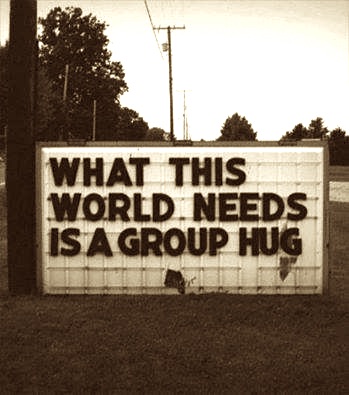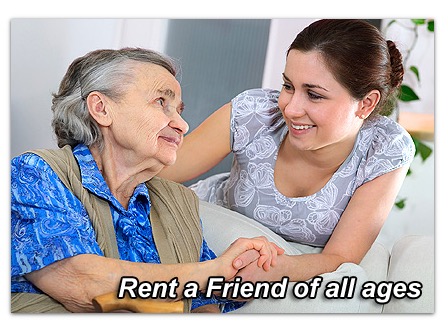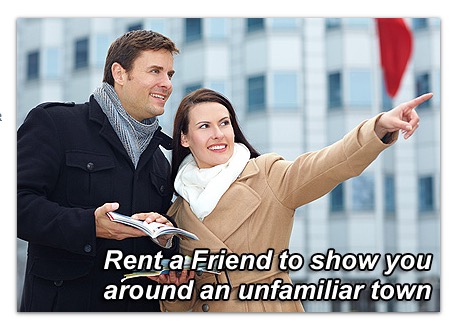sharing the journey of Relationship, Embodiment, and Awakened Living
sharing the journey of Relationship, Embodiment, and Awakened Living

An Asheville Cuddle Service
People have a need for simple, physical affection. Not sex, just touch.
Vitamin "T" is an essential nutrient. Ideally, people could meet this crucial, universal need with family or friends. But many of us don't have family nearby. And as one person happy to pay for cuddles puts it, “my friends are busy, you know?”
“The Snuggler" may be funny, but touch starvation is a serious epidemic. Millions of us are literally dying for affection. Few of us as adults have the opportunities that most of us get as children to simply hold or be held by another, to hug and caress each other in a loving way that is not about sex. In fact, there are few ways to enjoy any physical contact outside of sex. Besides social dancing and contact sports, where else can we touch each other without all the implications and complications?
 Sadly, most of us can't even ask our friends. Even a licensed massage or body-centered therapist won't take money to cradle you in their arms. Don't even mention spooning; that's even closer to sex. Compared to other cultures, it's as if you couldn't shake hands with people without it being taken as a come-on.
Sadly, most of us can't even ask our friends. Even a licensed massage or body-centered therapist won't take money to cradle you in their arms. Don't even mention spooning; that's even closer to sex. Compared to other cultures, it's as if you couldn't shake hands with people without it being taken as a come-on.
Our friends aren't just too busy to cuddle; many of us don't even have that kind of friend. Men can't show weakness, and women can't ask for touch, especially from men, without opening up the possibility of a sexual proposition. Men can't ask men to touch them for similar reasons.
Today, we're lucky if we have friends at all. A 2014 study in the U.K. found that one in ten people has no close friends. Most of us have at least one person we can confide in. But would you be comfortable asking your best friend to hold you and stroke your hair? Most of us would have to say "no." Do we really have to be sexual with someone just to be held?This is a sad state of affairs, one that The REAL Center is dedicated to improving. The question we'd like to pose is, when touch is so grossly lacking, is it ethical to sell it? Because that's actually what we're proposing to do.
In June of 2012, Jackie Samuel of New York became a professional snuggler. She soon inspired Samantha Hess of Portland to do the same, along with The Snuggle House of Madison and "Be the Love that You Are” in Boulder. A counselor and massage therapist in NYC offers "Hold Me Now" sessions. Some of these businesses are offering, or at least considering, overnight stays. Could we have a "cuddle service" here in Asheville? Is it even legal?
In most states, massage is illegal without a license. Here in North Carolina, the last time we looked into it, from 2008 to 2011, only four people were confronted about it and only two were fined. In any case, it is legal, at least on the state level, to touch someone for money if it's not manipulating muscles and not designed to turn them on. That would include Reiki, Healing Touch (offered in many hospitals), and holding someone. There can still be local hurdles to overcome, like the ones faced by The Snuggle House, but they overcame them.Of course, as with massage, there's a stigma associated with touching people for money. For one, people will suspect that this is just a cover for prostitution. Most people don't think hugging a stranger is all that creepy. And straight up sex for money hardly raises an eyebrow. But cuddling for cash? That's another story. The comments to popular articles on cuddle services — this one, in particular — are clearly indicative. So is one reporter's line: "spooning... no forking (if you catch my drift).” One commenter claims that one's practitioner profile actually said, "I can hold space for whatever you need to release.”
Like the founder of The Snuggle House puts it, is cuddling "pure" or "obscene?" Maybe this can help:
Many people also criticize the idea of putting touch up for sale. Nobody blames a massage therapist for charging for their time and expertise, yet here it seems more like we're charging for affection, for caring. In Japan, you can actually rent a family. As this Vice report illustrates, you can make as much as $800,000 a year for just hanging out with folks. That's right, not even cuddling (although there is the Japanese mafia to contend with).
The commodification of community is not just big in Japan. Here in the U.S., we have had "Rent a Friend" for years:



There are a growing number of “peer-to-peer” travel websites, and the sharing economy is bound to produce more. Of course, if you’re charging for it, it isn’t really “sharing.” There’s certainly something revolting about the very phrase, “rent-a-friend,” and for good reason. It should be called rent-a-companion because you can't really pay someone to be your friend. Yet the truth is that loving us is part of what we pay any good helping professional to do. That’s the dual meaning of being "cared for."
 Let’s be clear: cuddling is something everyone needs and no one should have to pay for. In a healthy culture, everyone would be doing it. You wouldn't have to pay $35 for a throwback to Harlow's monkey experiment or $150 a month
for antidepressants. We need hugs, not drugs!
Let’s be clear: cuddling is something everyone needs and no one should have to pay for. In a healthy culture, everyone would be doing it. You wouldn't have to pay $35 for a throwback to Harlow's monkey experiment or $150 a month
for antidepressants. We need hugs, not drugs!
We would like to think that most professionals charge for what they do not because they’d rather be doing something else but because they can’t afford to do it for free. Similarly, this business would provide not one but two things that our society desperately lacks: nonsexual touch and ethical, meaningful employment. Critics should look closely at the social and environmental effects of what they do for a living before they "cast the first stone."
One thing that would help in this regard might be to have a sliding scale, or at least to be a nonprofit and have our business model entirely above board. That way people can clearly see that no one's making a killing off of this.
For all these reasons, it makes more sense to offer a snuggle service in the context of an organization such as The REAL Center rather than as an individual. Eventually, The Healing Temple is going to be our noncommercial version of a cuddle center. It will run on donations. So far, the closest thing to a commercial version that we have offered is cuddle parties (see Steve talking about them on the Charlotte Today Show).
The problem with public and even private cuddle parties is that many people don't want to cuddle with strangers.Also, most people don't want to face the prospect of rejection, whether it’s having to ask someone to cuddle them or having to say no. That’s why our cuddle parties evolved into more of a workshop. Finally, a cuddle party is limited to a specific time and location. The same goes for a similar concept we’ve developed, the "Love Club” (don’t worry, it’s not what you’re probably thinking).
In summary, when it comes to cuddling, most people would be much more comfortable one on one and on their own time. A "storefront" model, with separate rooms just like a massage studio, would have these advantages. Hopefully it would be a little less kinky — and impersonal — than the cuddle parlor in the Vice video above (it's about halfway — at 5:53, to be exact). There would be privacy and a professional staff to choose from. People would have the opportunity to meet the staff in person via open houses, by just coming by, or by brief videos we'd post on the website. The space could have a hang-out space as well, like a pub or juice bar.
Either way, a 'snuggle studio' has the major advantage of being safer since it all goes on within our own professional, monitored space. The clients can be less concerned that things might turn sexual. And it’s far safer for staff. The Snuggle House has "a thorough screening process for new clients… to make sure they're seeking the service for the right reasons — and also to make sure the staff can provide the best possible experience." They also have security cameras in every room.
The main expense in all this would be renting the space. If that regard, if we do want a pub or cafe, then it is quite possible that whoever operates the concessions would cover the rent since we would be bringing in clientele. It could be a coincidence, but The Snuggle House is above a tavern. We would not want alcohol anywhere nearby, but part of the reason for being in a mixed use space is anonymity: "in case visitors are uncomfortable announcing their visit to the Snuggle House, there are several other businesses in the building that could serve as ‘covers’.” Even then, some clients will prefer house calls. Further down the line, with a sufficient screening process, we could consider that.
Since something this edgy is bound to attract attention, another benefit would be publicity. On opening, news of The Snuggle House quickly went national. Its Facebook page has 27k likes. "At this rate," says one writer, "merchandise sales could easily drive their business with no snuggles at all." Could this even become, like Massage Envy — and The Healing Temple, we hope — a national chain?
In Asheville at least, there would surely be no shortage of well-qualified people that would love to staff this. We could be selective and include some training. How much training? According to gawker.com, "Samuel is an expert in Cuddle Sutra, having mastered over 100 non-sexual positions." The Snuggle House claims to have a 100-page training manual! But for many clients, the need is quite straightforward: simple human connection.
In this culture, we experience social isolation on all levels. It’s no surprise, then, that many people want to talk while they snuggle. As one reporter puts it, “the greatest benefit may be in the ability to chat about anything you want (within the bounds of decency) with a stranger for an hour… The more you share, the less weird it seems to add physical contact.”
One reason people may want to talk is that touch deprivation blends into related issues like social isolation, shame, depression, possibly PTSD, and of course, what Shewey calls "erotic malnutrition.” As the man who runs the Boulder company says, "there's a lot going on emotionally for people around hugging with strangers." People may also come for support in times of transition, whether in grief or or anxiety.
Basically, cuddles are a kind of therapy. One professional snuggler calls it Cuddle Therapy. The Snuggle House calls it "touch therapy." It’s important, then, that the staff be what we call sacred intimates: that they be able to not just hold people but to also hold space for them. As Dinah Craik describes,
Oh, the comfort, the inexpressible comfort of feeling safe with a person, having neither to weigh thoughts nor measure words, but pouring them all out, just as they are, chaff and grain together, certain that a faithful hand will take and sift them, keep what is worth keeping, and with a breath of kindness blow the rest away.
One of the big issues in holding such compassionate space for people is the big possibility of what psychologists call transference. If you’re that affectionate with someone, they might fall in love with you — or vice versa! We would cover this in training.
Also, touch therapy may be legal, but as soon as you start talking, it can be construed as talk therapy, and it is illegal to counsel without a license. Note that this not just a matter of what you call it. Licensing boards are primarily concerned with people falsely representing themselves as professional counselors. But people who call themselves "life coaches" who are actually counseling can also get prosecuted. We don’t know if anyone in North Carolina has actually been even threatened with prosecution for this, but talk therapy is not what this is about anyway, so we would definitely avoid it.
Granted, the lines aren't always clear. A massage therapist can legally practice Somatic Experiencing. And surprisingly, apparently there is no professional prohibition on touch in the counseling field (see here, here, and here). Here's an article about legal issues around reiki. But the fact is, we're not talk therapists, and some people might need that, so we would be prepared to refer them as needed.
Besides legality, we'll also need to look at liability. Hopefully that's just a matter of a few hundred dollars a year for insurance, but The Snuggle House did have trouble getting it.
Moneywise, the professional cuddle businesses listed above all charge the same as massage therapists: namely, $60-75/hr. Alan’s brothers operate a Massage Envy franchise in Miami and could help us set up this business in much the same way. The therapists at Massage Envy trade a good chunk of their $60/hr — more than half of it, I believe — in exchange for the use of the space and plenty of steady work. As of 2013, Boulder snuggle house employees were seeing up to ten clients a week. Similarly, we imagine that staff here in Asheville would be happy to be paid as little as $15/hr (plus tips) if we took care of everything, including keeping them safe. Many, once they feel comfortable with a client, may choose to 'cut out the middle man' and meet at either of their homes. With that in mind, a noncompete clause in the employee contract would be in order, not because of the potential loss of business, but given the potential negative impact on the business if something were to happen, even outside of it.
Another business model could be a kind of club with memberships. The Boulder center offered this back in 2013, but it no longer appears on their website. Hopefully, we don't have to go this route just for legal reasons.
One thing that might help diffuse the stigma associated with snuggling is having a whole range of ages on staff, especially seniors (although the perception of seniors being non-sexual is also biased and inaccurate). It would help (and be a great service) to offer this in hospice or nursing homes. What about children as clients (as mentioned here) if not staff? Unfortunately, that would be just too volatile. But maybe some of the staff could be animals! The use of therapy animals and cats is well established. What better practitioner of holding space?
In conclusion, on both a personal and social level, we acknowledge that a commercial cuddle service is a compromise, a transitional strategy. It’s mainly a way support the work of The REAL Center and those involved. When it comes to cuddles, we want to put ourselves out of business. Let’s pray that we do.